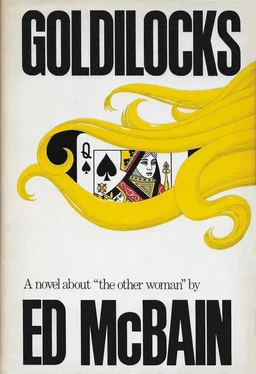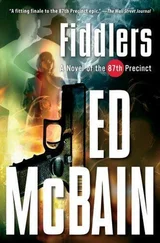I felt suddenly faint.
If he did not stop talking I would collapse. He was proclaiming his love for Catherine, telling how together last night they’d talked about their respective mates — he used that word, mates , as though he were a sailor or perhaps an Englishman in a pub, mates ; I had never heard anyone before, man or woman, referring to a marital partner as a mate. But Maureen was most certainly his mate, just as Dr. Eugene Brenet was Catherine’s mate. And Susan was mine, and a man I had never met was Agatha’s. A man named Gerald Hemmings, whom she would leave the moment I told my wife, my mate, that I was in love with another woman.
Jamie and his mistress had made the same decision, they made it last night in the place they rented on Whisper Key — this had, after all, been going on for more than a year now, they had advanced well beyond the motel stage, they could afford to rent a small cottage on the beach where they could make love. They promised to tell their respective mates soon, they obviously couldn’t go on this way. Soon, my darling, soon — he was describing their passionate farewell now, Catherine in his arms, kissing her face, her throat, I did not want to listen. Was this why I was ready to end my own marriage? So that seven years from now I could begin another affair with yet another woman, the Maureens and Catherines and Agathas of this world multiplying into an endless sorority of fornicating surgeons’ wives or court stenographers, cocktail waitresses or kindergarten teachers, one and all the same akimbo, each and all named Goldilocks?
He was on Jacaranda Drive now, he was pulling his car into the garage. The lights were on, this wasn’t strange, Maureen usually left them on when he was out playing poker. He cut the ignition and came around to the side door of the house, unlocked it. He was hoping she would be asleep. She sometimes waited up for him, but he hoped she hadn’t done that now. He was flushed with excitement, but this was not the time to tell her about his plans, not yet, he did not want her forcing his hand by asking unanswerable questions.
He snapped on the bedroom lights.
He saw the blood-spattered walls first.
He almost backed out of the room. He thought someone had, he thought his daughters, he thought, he did not know it was blood at first, he thought someone had soiled the walls. The blood smears were not the color of the bright red stripe that follows a surgeon’s scalpel and wells up into the incision, they were not the black-red of blood in a syringe or a bottle, they were almost brown. He thought at first — these were all instantaneous ideas that flashed into his mind with stopwatch frequency — he thought someone had smeared feces on the walls.
He saw her hand then.
The closet door was open, and he saw her hand protruding from inside the closet, palm upward. He moved to the closet door. He stopped. He looked down at the hand. He said, “Oh, my God,” and opened the door. He realized at once that she must have run into the closet to hide, her final refuge from whoever had slashed her nightgown to flowing tatters of nylon, her body to ribbons of flesh. There was a rosette on the bodice of the gown, it registered as a small pink eye against the blood-drenched pink of the gown itself. Her face was almost unrecognizable. There were deep gashes across her breasts, and her throat had been cut from one ear to the other so that there was a wide, grinning bloody mouth below her own mouth gaping at the ceiling. He knelt quickly beside her and closed her eyes, thinking absurdly that she should not witness this horror.
And then he remembered the children.
He got to his feet. He stumbled to the door and down the corridor to their room, thinking, praying they were asleep, hoping the sounds of her struggle had not wakened the children, had not revealed to the intruder that there were two young girls in this house besides the woman he’d already killed.
He almost tripped over Emily in the doorway to the bedroom.
He backed away, he backed away.
He screamed—
The telephone shrilled into the sudden stillness of Frank’s office. He picked it up immediately.
“Hello?” he said. “Yes, Cynthia.” He looked at me. “For you, Matt.”
It was Betty Purchase, Jamie’s former wife, telling me she’d just been visited by a Detective Ehrenberg of the Calusa Police Department, and asking if I could come to her house at once.
The last time I’d spoken to Betty was in January, when I’d threatened her with a partition sale, and she’d told me to go ahead and sue, Charlie. She was rather more cordial now as she ushered me into the huge house she had once shared with Jamie. I knew her, of course, I had run into her at cocktail parties here and there around town; it was impossible to live in a place like Calusa without meeting everyone sooner or later. She was wearing a gray tailored pants suit, a brandy-colored blouse showing in the V of the jacket opening. Her black hair was cropped close to her head in a shingle bob. Her eyes were a deep brown. She was not an unattractive woman, but there was a tight, pinched look to her face, and it communicated an anger that seemed volatile and dangerous. She walked with a stiff, unwomanly gait — I recalled abruptly that Jamie had described her as frigid for the first thirteen years of their marriage. On the deck, she offered me a chair, and then took a chair opposite me. Beyond, the ocean crashed in against a mile-long stretch of white sand beach. The house and the grounds had been part of the divorce settlement. The rest, according to Jamie, had been two hundred thousand dollars in cash, and thirty thousand a year in alimony.
She offered me a drink. I declined; it was still only eleven-thirty in the morning. She asked if I would care for some coffee. Some iced tea? Again, I declined. Then, without preamble, she said, “I want to know what Jamie told the police.”
“About what?”
“About me.”
“Only that you were once married.”
“Then why did they come here asking questions? Did Jamie tell them I might have had something to do with the murders?”
“No, he did not.”
“I don’t believe you.”
“You should have expected the police,” I said. “A visit to a former wife would seem routine in a case—”
“No, it wasn’t routine, don’t tell me it was routine ,” she said sharply, and rose abruptly and began pacing.
“Betty,” I said, “on the phone, you told me you wanted to talk to Jamie’s attorney. Okay. I’m here. I’ve already told you that Jamie didn’t even hint —”
“Then why do they think I might have done it?”
“Did they say they thought so?”
“They wanted to know where I was last night.”
“What’d you tell them?”
“I told them I was here.”
“Then what are you worried about?”
“They wanted to know if anyone was with me. I told them no one was with me, I was here alone watching television. I’m a woman without a husband, I’m forty-two years old, where the hell did they think I’d be on a Sunday night?”
“Betty, I still don’t understand why—”
“Don’t you? They wanted to know what television shows I’d been watching, whether I’d made any phone calls or received any, what time I went to bed. What does that sound like to you?”
“Routine questioning. If you’d in fact talked to anyone on the phone—”
“I didn’t talk to a goddamn soul all night,” she said. “My phone doesn’t ring too often these days.” The eyes were tighter now, the mouth thin. “I’m a woman alone in a town full of divorcées and widows. When a man can find himself a twenty-year-old in a bar or on a beach, he’s not too inclined...”
Читать дальше












